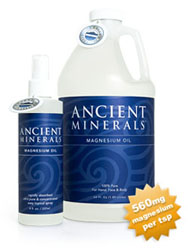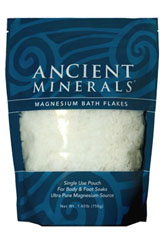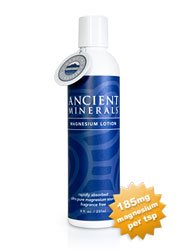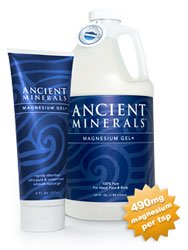Magnesium has gotten a lot of buzz lately. Recent studies have found that nearly 68% of Americans are low in the RDA recommended intake of magnesium (a pitifully low dietary suggestion to begin with) and that a projected 200 million Americans suffer the consequences of magnesium deficiencies. But why? Activating over 300 enzymatic reactions and assisting with thousands of biochemical functions within the body, magnesium’s vital role as a healing agent has far-reaching medicinal history and is the subject of documented western research dating as far back as the 1600’s. Yet, due to several haphazard trends of our modern health and dietary practices, this essential mineral has detrimentally slid off the radar until now- even for some of the most avid “healthnuts.” Here are 5 reasons why you may be magnesium deficient without even knowing it.
1. Synthetic Supplements and Fortification
 Many people don’t realize that daily rituals of swallowing down handfuls of expensive rainbow vitamins and smacking lips after slurps of fortified OJ at breakfast, are not very helpful habits. Most of the supplements sold in today’s popular market are artificial, laboratory processed chemicals that are largely unusable by the human body, and the same goes for the isolated nutrients packed into fortified products. Our bodies have been innately designed to work with the complex nutrients found in whole foods, which are presented in a balanced composition for utilization. When nutrients are harshly manipulated or segmented, the synergy is lost. In this way it is also easy for some vitamins and minerals to be consumed at overwhelming high rates while others are neglected. A tragic example of this asymmetry is the ignored physiological relationship of calcium and magnesium. Calcium is responsible for signaling muscle contraction, whereas magnesium is required for muscle relaxation. While research has confirmed that calcium to magnesium ratios in the paleolithic diet were 1:1, our “bone building calcium-craze” has left modern individuals with a warped exposure, reaching anywhere from 5:1 to 15:1. Studies have clearly demonstrated that excess calcium destorys magnesium, while magnesium supplementation significantly improves the body’s use of calcium. It is thus important that the delicate balance between the minerals is preserved by dualistic intake.
Many people don’t realize that daily rituals of swallowing down handfuls of expensive rainbow vitamins and smacking lips after slurps of fortified OJ at breakfast, are not very helpful habits. Most of the supplements sold in today’s popular market are artificial, laboratory processed chemicals that are largely unusable by the human body, and the same goes for the isolated nutrients packed into fortified products. Our bodies have been innately designed to work with the complex nutrients found in whole foods, which are presented in a balanced composition for utilization. When nutrients are harshly manipulated or segmented, the synergy is lost. In this way it is also easy for some vitamins and minerals to be consumed at overwhelming high rates while others are neglected. A tragic example of this asymmetry is the ignored physiological relationship of calcium and magnesium. Calcium is responsible for signaling muscle contraction, whereas magnesium is required for muscle relaxation. While research has confirmed that calcium to magnesium ratios in the paleolithic diet were 1:1, our “bone building calcium-craze” has left modern individuals with a warped exposure, reaching anywhere from 5:1 to 15:1. Studies have clearly demonstrated that excess calcium destorys magnesium, while magnesium supplementation significantly improves the body’s use of calcium. It is thus important that the delicate balance between the minerals is preserved by dualistic intake.
2. Caffeine, Alcohol and Carbonation
 Despite their popularity and broad acceptance in our culture, these chemicals and drugs have more profound and subtle effects in the body than we are oftentimes willing to believe. Caffeine containing beverages like coffees, teas and sodas are stimulants with a diuretic effect. Thus in the body, they have been found to cause an accelerated flushing of magnesium through the kidneys, regardless of physiological need. Coupled with high caffeine content, dark colored sodas contain phosphates which bind magnesium in the digestive tract, preventing any gastric mineral assimilation. Alcohol on the other hand is a depressant, but through suppression of anti-diuretic hormone (ADH), also causes increased magnesium loss through the kidneys. Moreover, alcohol contributes to vitamin D deficiency as well as digestive malfunction, further minimizing the body’s ability to absorb magnesium effectively. Thus, even if you focus on gobbling down magnesium-rich foods or attempt to supplement orally, the valuable content will be quickly whisked away with a slug of any one of these beverages.
Despite their popularity and broad acceptance in our culture, these chemicals and drugs have more profound and subtle effects in the body than we are oftentimes willing to believe. Caffeine containing beverages like coffees, teas and sodas are stimulants with a diuretic effect. Thus in the body, they have been found to cause an accelerated flushing of magnesium through the kidneys, regardless of physiological need. Coupled with high caffeine content, dark colored sodas contain phosphates which bind magnesium in the digestive tract, preventing any gastric mineral assimilation. Alcohol on the other hand is a depressant, but through suppression of anti-diuretic hormone (ADH), also causes increased magnesium loss through the kidneys. Moreover, alcohol contributes to vitamin D deficiency as well as digestive malfunction, further minimizing the body’s ability to absorb magnesium effectively. Thus, even if you focus on gobbling down magnesium-rich foods or attempt to supplement orally, the valuable content will be quickly whisked away with a slug of any one of these beverages.
3. Chronic Stress
 The epidemic levels of stress in our culture are hard to ignore. Some studies indicate that nearly 90% of visits to primary care physicians are stress related in some way, and anxiety disorders are on the rise with over 40 million sufferers in the United States alone. Our pervasive modern tendency towards chronic tension has left many caught in the midst of a continual “flight-or-fight” state, with little relief or resolution. Physiologically, human nervous systems were not designed to fire at this level of persistence. Research has found that the frequent release of adrenaline and cortisol involved in an unresolved stress response is strongly correlated with decreased magnesium. What’s worse? It all works in a vicious cycle: because magnesium is an integral part of nerve conduction and electrolyte balance, low levels can confound sensations of anxiety, sleep disturbance and depression. This paradoxical patterning is frustrating and inescapable if looked at through conventional, one-sided approaches like therapy and medication. Alternatively, exploring the avenues of lifestyle change, dietary therapy and supplemental magnesium rebalancing together, may provide an effective therapeutic protocol.
The epidemic levels of stress in our culture are hard to ignore. Some studies indicate that nearly 90% of visits to primary care physicians are stress related in some way, and anxiety disorders are on the rise with over 40 million sufferers in the United States alone. Our pervasive modern tendency towards chronic tension has left many caught in the midst of a continual “flight-or-fight” state, with little relief or resolution. Physiologically, human nervous systems were not designed to fire at this level of persistence. Research has found that the frequent release of adrenaline and cortisol involved in an unresolved stress response is strongly correlated with decreased magnesium. What’s worse? It all works in a vicious cycle: because magnesium is an integral part of nerve conduction and electrolyte balance, low levels can confound sensations of anxiety, sleep disturbance and depression. This paradoxical patterning is frustrating and inescapable if looked at through conventional, one-sided approaches like therapy and medication. Alternatively, exploring the avenues of lifestyle change, dietary therapy and supplemental magnesium rebalancing together, may provide an effective therapeutic protocol.
4. Refined Sugars
 The destructive link between sugar and inflammation is a popular topic of discussion in the dietary community these days, but how does this relate to magnesium? Unsurprisingly, during the process of refinement, sugar cane is completely stripped of molasses content and consequently plundered of all traces of potential magnesium content. Yet beyond this singular deficiency, refined sweets in general are what some specialists call "anti-nutrients." Not only do sugars greedily take the place of nutrient-dense whole foods in the diet to sacrifice any chances at grasping dietary magnesium, but they gobble up already low supplies of energy and minerals for the process of digestion. The consequences of excessive consumption of pleasantly wrapped bon-bons and seemingly innocent processed granola bars thus include digestive strain, hormonal dysregulation, mood disruption and weight gain, as well as chronic mineral depletion. Furthermore, with an inflamed system ravaged by sugars, the organs' capacity to capture delicate magnesium and other vital nutrients is significantly diminished. Trying sweeteners like stevia, raw honey and maple syrup may be helpful in satisfying sweet cravings without causing such harmful depletion.
The destructive link between sugar and inflammation is a popular topic of discussion in the dietary community these days, but how does this relate to magnesium? Unsurprisingly, during the process of refinement, sugar cane is completely stripped of molasses content and consequently plundered of all traces of potential magnesium content. Yet beyond this singular deficiency, refined sweets in general are what some specialists call "anti-nutrients." Not only do sugars greedily take the place of nutrient-dense whole foods in the diet to sacrifice any chances at grasping dietary magnesium, but they gobble up already low supplies of energy and minerals for the process of digestion. The consequences of excessive consumption of pleasantly wrapped bon-bons and seemingly innocent processed granola bars thus include digestive strain, hormonal dysregulation, mood disruption and weight gain, as well as chronic mineral depletion. Furthermore, with an inflamed system ravaged by sugars, the organs' capacity to capture delicate magnesium and other vital nutrients is significantly diminished. Trying sweeteners like stevia, raw honey and maple syrup may be helpful in satisfying sweet cravings without causing such harmful depletion.
5. Deficient Soils
 While some vitamins are produced within plants during growth, foods containing magnesium absorb their mineral content from the soil. Foods that are traditionally high in dietary magnesium include legumes, whole grains and green leafy vegetables. However, through years of agricultural abuse and environmental change, the vital composition of the soils across the globe has been tragically drained. Modern fertilization, used as an alternative for traditional crop-rotation practices, has eradicated vitamin-fixing bacteria and naturally aerating earthworms from the soil, and overused fields to the point of barrenness. Resulting produce has high yield, but is free radical containing, nutrient deficient and bulked with carbohydrates and water. Studies from the Journal of American College of Nutrition have revealed a startling 40% drop in the nutrient content of vegetables since 1950 alone. Thus, even if we work hard to follow whole food diets using organic practices, isolated efforts are just not enough to restore ancient minerals like magnesium into diets at a sufficient level. While scientists are optimistic that returning to respectful organic processes can save the nourishing stability of our soils, this process will take many years and unified global efforts to have any success.
While some vitamins are produced within plants during growth, foods containing magnesium absorb their mineral content from the soil. Foods that are traditionally high in dietary magnesium include legumes, whole grains and green leafy vegetables. However, through years of agricultural abuse and environmental change, the vital composition of the soils across the globe has been tragically drained. Modern fertilization, used as an alternative for traditional crop-rotation practices, has eradicated vitamin-fixing bacteria and naturally aerating earthworms from the soil, and overused fields to the point of barrenness. Resulting produce has high yield, but is free radical containing, nutrient deficient and bulked with carbohydrates and water. Studies from the Journal of American College of Nutrition have revealed a startling 40% drop in the nutrient content of vegetables since 1950 alone. Thus, even if we work hard to follow whole food diets using organic practices, isolated efforts are just not enough to restore ancient minerals like magnesium into diets at a sufficient level. While scientists are optimistic that returning to respectful organic processes can save the nourishing stability of our soils, this process will take many years and unified global efforts to have any success.
“I’m convinced that to get enough magnesium today, you need to take supplements”
- Dr. Carol Dean, M.D, N.D The Magnesium Miracle
While ideally all vitamins and minerals would come from the beautiful healing powers of our foods, the integration of many factors makes supplementing with magnesium important in our modern world. Because oral magnesium can cause significant gastric discomfort, topical magnesium chloride has proven to be a highly effective way to correct magnesium deficiency, and can actually be an enjoyable process too. Transdermal magnesium is rubbed or sprayed onto the skin, and absorbed very efficiently in this way. It is conveniently available in gels, oils, lotions and bath flakes to your preference. At Radiant Life, we have found some people make a stress-relieving soak with the magnesium bath flakes a ritual, while others prefer on-the-go sprays. To learn more about the simple process of transdermal magnesium and health benefits see our blog article Ancient Minerals: Are you Magnesium Deficient?, and visit our website for specifics on products and dosing.
Resources
The Magnesium Miracle by Carol Dean, M.D, N.D
Transdermal Magnesium Therapy by Mark Sircus, Ac., O.M.D.
Ancient Minerals: Ultra Pure Topical Magnesium




